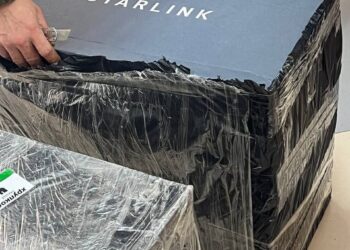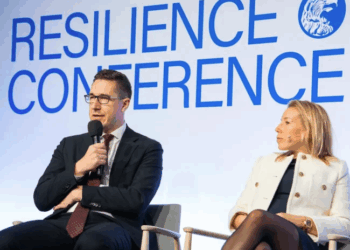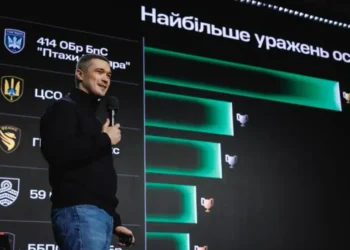The French Army is nicknamed La Grande Muette, “The Great Mute” in reference to its long-standing stance of neutrality (and thus silence) in all things politics, economics, and civil life. But these days – with an imperative across Europe to build more self-sufficiency and initiative into national defences – it’s finally making some noise.
Last month, the French Ministère des Armées (MinArm) – the French equivalent of the U.S. Department of Defense and U.K. Ministry of Defence – held court at VivaTech, the 180k-visitor technology fair held annually in Paris. Its large pavilion showcased open innovation projects in the fields of space, AI, quantum, defensive cyber operations, and wargaming; and alongside that, MinArm set out a new playbook for the 14,000 startups visiting the show. “Innovate with Defence,” it said, with a one-stop shop (literally “Guichet Unique”) to fast-track engagement with startups building dual-use technologies that include military applications.
Guichet Unique was not formed out of thin air. It’s a newer effort from the Agence Innovation Défense (AID), an agency created back in 2018 to accelerate how the latest innovations in tech can be implemented to address new threats.
Notably, the point of AID is not procurement – improving the procurement loop is a challenge the French military is addressing elsewhere – but innovation, and on that front it’s looking to streamline the red tape that existed before.
“[Guichet Unique] is much better than a catalogue of options,” said its head Xavier Itard.
The overall effect is one of a change of posture for the French military. Rather than a startup having to guess (or already know) which grant it could apply for, or which entity it could work with, prospective partners, which also include industry players, labs, SMEs and personnel, now have a more user-friendly point of entry, a single desk that helps navigate how they can work with MinArm.
This is significant because previously, most startups – especially those recently founded, or those new to working with the military – would not have known the many MinArm entities and options with names like the Cyber Defense Factory, the Joint Directorate of Infrastructure Networks and Information Systems (DIRISI), the ground forces’ Commandement du Combat Futur (CCF), and the addition of the one-year-old Ministerial Agency for Defence Artificial Intelligence (AMIAD).
Itard insisted on engagement being a dialogue, where both parties come up with collaboration ideas that may not have occurred to them.
This can start with an in-person conversation at and event like VivaTech, the Paris Air Show, or any of the other events he and his team’s eight staffers are attending. But it is not a requirement: entrepreneurs can also move on directly to the next step and submit their interest online.
The process also includes a brainstorming dialogue via phone, which Itard said has the added benefit of enabling experts from across France to join. He added that the door is open to non-French startups, with the usual security caveats.
The outreach effort appears to be working. Typically AID gets between 150 and 200 submissions annually, and the desk received 75 project proposals in the first quarter of 2025 alone.
Guichet Unique has been notable in part because it’s helped to bring more startups – founded to focus on enterprise – into the military and defense arena.
One example is Kayrros, a French startup analysing satellite data to detect energy and environmental risks, such as fires and methane leaks. This year, it presented its first dual-use project, Detevent, focused on detecting unusual human activity on a large scale. Like the other startups we talked to, its representatives were largely positive about their engagement with the government entity.
Itard was personally involved in securing funding for Detevent, a partnership also involving multidisciplinary research lab Centre Borelli. Overall, he said, his desk helped projects obtain €20 million in grants last year.
However, MinArm says it can do much more for startups than just awarding grants. There’s also the French Defence Innovation Fund, which backed some companies that were presenting projects at the pavilion, such as Exotrail, a space infrastructure startup, and Unseenlabs, which raised an €85 million Series C round led by the €275 million fund in 2024.
Exotrail co-founder Nicolas Heitz confirmed that getting backing from the fund, which is managed by French public investment bank Bpifrance, definitely contrasted with traditional VC investment: for one, it looked at his startup through a sovereignty-focused lens.
Most startups that engage with the one-stop-shop won’t go as far as getting equity from MinArm, but Itard and his team are aiming to ensure their first dual-use projects are more than one-offs.
This also aligns with France’s broader ambitions. With Mistral AI and other “French champions” in the spotlight, plus new momentum building across Europe for technological independence, sovereignty was the watchword at VivaTech heralded by no less than President Emmanuel Macron.
Already, France had set the tone with its interministerial €54 billion “France 2030” plan. Launched back in 2021, it aims to strengthen the country’s industrial competitiveness and support breakthrough technologies that are crucial for national sovereignty. For MinArm, the mission order is clear: turn startups into key long-term players.












